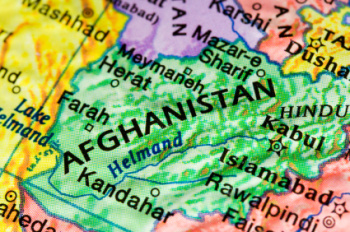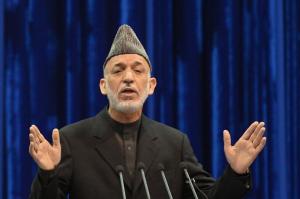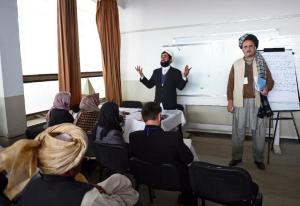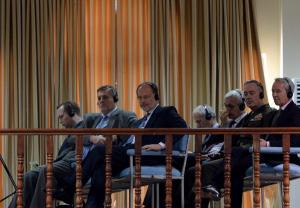Afghanistan....
http://news.yahoo.com/kabul-rebuffs-us-demand-sign-security-deal-soon-075540930.html
 Karzai suggested that the pact “should be signed when the election has already taken place, properly and with dignity.” It had long been believed that a deal wouldn’t be possible until Karzai’s successor was elected at any rate, though after the deal was reached US officials hoped the jirga would sign off on it early.
Karzai suggested that the pact “should be signed when the election has already taken place, properly and with dignity.” It had long been believed that a deal wouldn’t be possible until Karzai’s successor was elected at any rate, though after the deal was reached US officials hoped the jirga would sign off on it early.
 The text of the deal was finalized yesterday, and is being presented to the Afghan Loya Jirga, the nation’s informal tribal assembly, for a vote before ratification. The Obama Administration has suggested no intention of putting it to the US Congress, however.
The text of the deal was finalized yesterday, and is being presented to the Afghan Loya Jirga, the nation’s informal tribal assembly, for a vote before ratification. The Obama Administration has suggested no intention of putting it to the US Congress, however.
 Iran seemed taken aback by this, saying there were none of the bilateral talks they were expecting and that there is “no prospect” for a deal at the present.
Iran seemed taken aback by this, saying there were none of the bilateral talks they were expecting and that there is “no prospect” for a deal at the present.
 Terming Israel’s position a demand for “total capitulation” from Iran, White House officials said they believed if the world took that position Iran really would try to make a nuclear weapon, and that would lead to a war.
Terming Israel’s position a demand for “total capitulation” from Iran, White House officials said they believed if the world took that position Iran really would try to make a nuclear weapon, and that would lead to a war.
 Khan had initially threatened such a blockade after the November 1 US drone strike that killed Hakimullah Mehsud, just 24 hours before Hakimullah was set to open peace talks with the Pakistani government, but delayed his plans when no US strikes followed.
Khan had initially threatened such a blockade after the November 1 US drone strike that killed Hakimullah Mehsud, just 24 hours before Hakimullah was set to open peace talks with the Pakistani government, but delayed his plans when no US strikes followed.
http://news.yahoo.com/kabul-rebuffs-us-demand-sign-security-deal-soon-075540930.html
Kabul (AFP) - Afghanistan on Friday rebuffed a US demand to sign a highly anticipated security pact as soon as possible, insisting the document must wait until after next year's presidential election.
Washington warned Kabul on Thursday to sign the Bilateral Security Agreement (BSA) pact as soon as possible, with senior officials hinting that delaying beyond the end of this year could mean no post-2014 US troop presence.
The latest US run-in with President Hamid Karzai was set off by the Afghan leader's statement that the painstakingly negotiated pact would not be signed until after the election in April.
US officials bristled, saying the deal, which governs the conditions of any post-war American counter-terrorism and training mission in Afghanistan, must be signed by the end of the year.
The White House said it needed a swift decision from Karzai to start planning the footprint of any US forces, and warned Obama had not yet decided on whether to keep US forces in Afghanistan.
"Failure to get this approved and signed by the end of the year would prevent the United States and our allies from being able to plan for a post-2014 presence," White House spokesman Josh Earnest said.
Karzai had said the pact currently under consideration by a loya jirga, a meeting of tribal chieftains, could only be signed "when our elections are conducted, correctly and with dignity".
His spokesman Aimal Faizi stood firm on the issue on Friday.
"Security, peace and good elections are key to the signing of the BSA," Faizi told AFP.
"Let's wait and see what will the loya jirga decide on the document. If approved, as the president said, it will be signed after elections."
Senior US officials speaking on condition of anonymity were blunt, warning that it was not practical for the BSA to await the signature of the next Afghan president.
They said that if there were no BSA in force, there would be no US troop garrison in Afghanistan after NATO combat troops leave in 2014.
Karzai on Thursday told jirga delegates that the BSA would allow up to 15,000 foreign troops to stay in the war-torn country.
Afghanistan goes to the polls on April 5 to elect a successor to Karzai, who must step down after his two terms. A credible election is seen as crucial to the country's future stability.
The BSA governs the terms and legal status of US troops who might stay behind in Afghanistan, and the draft, which must also be approved by the Afghan parliament, emerged after tortuous negotiations.
Obama stepped in this week with a letter to confirm a deal on the vexed question of US forces raiding Afghan homes.
However, American officials quickly knocked down a flurry of media reports suggesting that Karzai would get an apology for the price borne by Afghan civilians during the 12-year war.
The letter released by Karzai's office said US forces would not enter Afghan homes for military operations "except under extraordinary circumstances involving urgent risk to life and limb of US nationals".
The issue is a sensitive one in Afghanistan and had for a time appeared to pose a serious threat to the deal.
Supporters of the deal say it is vital for post-2014, when the bulk of NATO's 75,000 troops will pull out. The Taliban insurgency this year has reached levels of violence not seen since 2010, according to the United Nations.
Karzai also gave a brutal assessment of his often thorny relationship with Washington, his principal foreign backer, on Thursday.
"America does not trust me and I do not trust them. I have had struggles with them and they have spread propaganda against me," he said.
The Taliban condemned the jirga as an American plot and threatened to target its delegates if they approve the deal.
A draft text released by Kabul Wednesday appeared to show Karzai had bowed to a US demand that American troops would not be tried in local courts if they are accused of crimes.
A similar security deal between the United States and Iraq collapsed in 2011 over the issue of whether American troops would be answerable to local courts, leading Washington to pull its forces out.
But the text, published on the Afghan foreign ministry website, said Kabul had agreed that the United States should have "the exclusive right to exercise jurisdiction" over its forces.
Karzai Wants Delay on US Pact, White House Issues Ultimatum
US Demands Deal by Year's End
by Jason Ditz, November 21, 2013
Just one day after reaching an agreement on the terms of the Bilateral Security Agreement (BSA) to keep US occupation forces in Afghanistan for decades to come, President Hamid Karzai has urged the Loya Jirga to hold off approval of the pact until after his term in office ends in April.
 Karzai suggested that the pact “should be signed when the election has already taken place, properly and with dignity.” It had long been believed that a deal wouldn’t be possible until Karzai’s successor was elected at any rate, though after the deal was reached US officials hoped the jirga would sign off on it early.
Karzai suggested that the pact “should be signed when the election has already taken place, properly and with dignity.” It had long been believed that a deal wouldn’t be possible until Karzai’s successor was elected at any rate, though after the deal was reached US officials hoped the jirga would sign off on it early.
And now they’re demanding it. White House officials issued an ultimatum in the wake of Karzai’s comments, demanding that the Afghan government finalize the pact by the end of December, or risk the US leaving outright.
That threat ironically means a lot more to whoever wins the election in April than it will to the Afghan people, and by extension much of the Loya Jirga, as many resent the occupation and oppose its continuation unless under very strict limitations. Karzai’s successor would likely prefer the troops to stay to try to prop up his government, but whoever it is won’t be able to do anything about it until after the April vote.
Senators Want to Vote on Continued Afghan Presence
Afghan Jirga Gets a Vote, Why Not Congress?
by Jason Ditz, November 21, 2013
They appear to be in the minority so far, but a handful of senators both Democrat and Republican are pushing a resolution that would oblige the Obama Administration to bring the Bilateral Security Agreement (BSA), which will keep US troops in Afghanistan “through 2024 and beyond,” to an actual vote in the Senate.
 The text of the deal was finalized yesterday, and is being presented to the Afghan Loya Jirga, the nation’s informal tribal assembly, for a vote before ratification. The Obama Administration has suggested no intention of putting it to the US Congress, however.
The text of the deal was finalized yesterday, and is being presented to the Afghan Loya Jirga, the nation’s informal tribal assembly, for a vote before ratification. The Obama Administration has suggested no intention of putting it to the US Congress, however.
And that’s not surprising. Though the US Constitution does require a two-thirds majority vote of the US Senate for any treaty, in recent history US presidents have ignored that requirement on many controversial pacts, arguing that they aren’t technically treaties, but rather an “executive agreement” which Congress gets no say in.
The senators are hoping to attach a requirement for a vote to the National Defense Authorization Act (NDAA), but White House officials say that the pact is in keeping with President Obama’s public statements, and no such vote should take place.
Iran nuclear talks hit snag or perhaps not .....
 Iranian Foreign Minister Javad Zarif said the lack of top officials meant yesterday’s negotiations, which focused on compromises on areas of disagreements, had to be consulted on after the talks adjourned. Other Iranian officials termed the resultspromising, and the deal is said to be back on the right track.
Iranian Foreign Minister Javad Zarif said the lack of top officials meant yesterday’s negotiations, which focused on compromises on areas of disagreements, had to be consulted on after the talks adjourned. Other Iranian officials termed the resultspromising, and the deal is said to be back on the right track.
Iran Talks Progress, Foreign Ministers Head to Geneva
Compromise Would Allow Work on Arak Reactor
by Jason Ditz, November 22, 2013
Yesterday’s Geneva talks didn’t look promising, with the six P5+1 foreign ministers all no-shows, but talks seem to be picking up, and most of those officials have now either arrived or are en route, raising the chances of a deal getting signed in the next day or two.
 Iranian Foreign Minister Javad Zarif said the lack of top officials meant yesterday’s negotiations, which focused on compromises on areas of disagreements, had to be consulted on after the talks adjourned. Other Iranian officials termed the resultspromising, and the deal is said to be back on the right track.
Iranian Foreign Minister Javad Zarif said the lack of top officials meant yesterday’s negotiations, which focused on compromises on areas of disagreements, had to be consulted on after the talks adjourned. Other Iranian officials termed the resultspromising, and the deal is said to be back on the right track.
Among the compromises reached was the question of the Arak Heavy Water Reactor. Under the terms of the deal, Iran could continue work on the plant itself during the six month “interim” deal, but would not make any more fuel rods for it in that time. The reactor runs on unenriched uranium.
Another sign that the interim deal may be imminent came in the Israeli press, where officials say Netanyahu has more or less stopped trying to kill that pact, believed it is “out of reach,” and is instead focusing on trying to prevent a final deal from being negotiated after the six month interim period is over.
P5+1 Leaders No-Show: Iran Talks Losing Momentum?
No Plans for Foreign Ministers to Attend Talks
by Jason Ditz, November 21, 2013
The prospect of Iran and the P5+1 hammering out a deal in the current three days of talks in Geneva is looking less and less likely, as every single foreign minister from all six P5+1 nations were missing in action.
 Iran seemed taken aback by this, saying there were none of the bilateral talks they were expecting and that there is “no prospect” for a deal at the present.
Iran seemed taken aback by this, saying there were none of the bilateral talks they were expecting and that there is “no prospect” for a deal at the present.
The State Department shrugged off the news, saying all six nations had agreed the European Union’s Catherine Ashton would do all the negotiating for now. Ashton suggested the foreign ministers might come later if the talks made progress, but that there are “no plans” for that to happen currently.
The last round of Geneva talks had virtually finalized a deal, at which point all of the foreign ministered show up for an expected signing ceremony that was later killed by last minute French opposition. It had been assumed they’d return to where they left off at those talks, but officials seem content to tone down the talks for now, which not only downgrades the prospect for a deal, but raises the chances that even if Ashton does get something close to finalized, the foreign ministers might kill it again if and when they bother to show up.
White House: Israel’s Stance on Iran Would Lead to War
Demands Would Alienate Other Nations
by Jason Ditz, November 21, 2013
The White House has issued another statement criticizing Israel’s stance on diplomacy with Iran, insisting their “all-or-nothing” proposal, demanding Iran unilaterally give up the sum total of its civilian nuclear program and not accepting anything less, was a recipe for war.
 Terming Israel’s position a demand for “total capitulation” from Iran, White House officials said they believed if the world took that position Iran really would try to make a nuclear weapon, and that would lead to a war.
Terming Israel’s position a demand for “total capitulation” from Iran, White House officials said they believed if the world took that position Iran really would try to make a nuclear weapon, and that would lead to a war.
Israeli officials don’t seem to be disputing that aspect of their demand, and indeed the fact that the demands would be rejected and could then be used as a pretext for war appear to be their primary appeal for hawks in the Netanyahu government.
The White House comments warned that the position risked alienating other P5+1 members, as well as other nations who up until now have been abiding by the sanctions, but which might jump ship if the demands of Iran get less and less reasonable. Though they offered no specifics, there have been reports of some nations growing weary of the endless sanctions position, and the US warning might reflect that.
Pakistan......
Pakistan’s Imran Khan to Block NATO Supplies After Drone Strike
Attack on School Putting Civilian Lives in Danger
by Jason Ditz, November 21, 2013
NATO is about to lose access to its primary supply line into occupied Afghanistan, the Khyber Pass, as Imran Khan, the leader of the Pakistani Tehreek-e Insaf (PTI), the political party which runs the Khyber Pakhtunkhah Province (KP) through which the supplies travel, has vowed to implement a blockade in retaliation for US drone strikes.
 Khan had initially threatened such a blockade after the November 1 US drone strike that killed Hakimullah Mehsud, just 24 hours before Hakimullah was set to open peace talks with the Pakistani government, but delayed his plans when no US strikes followed.
Khan had initially threatened such a blockade after the November 1 US drone strike that killed Hakimullah Mehsud, just 24 hours before Hakimullah was set to open peace talks with the Pakistani government, but delayed his plans when no US strikes followed.
Last night, the day of Khan’s initial deadline for ending all drone attack, the US drones attacked a religious school in the KP city of Hangu, destroying it and killed eight people.
Khan said that the provincial cabinet has been called in for an emergency meeting after the strike, and is expected to implement the blockade over the weekend. He also condemned the strikes for putting civilians’ lives in danger. The opposition Awami Muslim League has thrown its support behind the blockade as well.
The ruling party on a national level, the Pakistani Muslim League-N (PML-N) has not yet commented on the planned blockade, and Khan has accused their leader, Prime Minister Nawaz Sharif, of secretly permitting the US strikes even as he publicly condemns them. PML-N officials denied the allegation, but gave no indication they’d do anything about the latest attack.



No comments:
Post a Comment